Dumnocoveros was a local ruler or king based in the English East Midlands, around the time of the Roman conquest of Britain. He is traditionally thought to have been a ruler of the Corieltavi, a Celtic tribe who inhabited this region in the Roman period and perhaps before.
He is only known from coin inscriptions, which suggest that he was a co-ruler or subordinate of Volisios.
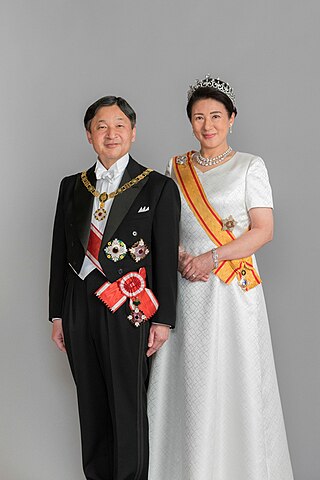
The word emperor can mean the male ruler of an empire. Empress, the female equivalent, may indicate an emperor's wife, mother/grandmother, or a woman who rules in her own right and name. Emperors are generally recognized to be of the highest monarchic honour and rank, surpassing king. In Europe, the title of Emperor has been used since the Middle Ages, considered in those times equal or almost equal in dignity to that of Pope due to the latter's position as visible head of the Church and spiritual leader of the Catholic part of Western Europe. The emperor of Japan is the only currently reigning monarch whose title is translated into English as "Emperor".

The Kingdom of the West Saxons, also known as the Kingdom of Wessex, was an Anglo-Saxon kingdom in the south of Great Britain, from around 519 until Alfred the Great declared himself as King of the Anglo-Saxons in 886.

Marcus Aurelius Antoninus, better known by his nickname Caracalla, was Roman emperor from 198 to 217 AD. He was a member of the Severan dynasty, the elder son of Emperor Septimius Severus and Empress Julia Domna. Severus proclaimed Caracalla co-ruler in 198, doing the same with his other son Geta in 209. The two brothers briefly shared power after their father's death in 211, but Caracalla soon had Geta murdered by the Praetorian Guard and became sole ruler of the Roman Empire. Julia Domna had a significant share in governance, since Caracalla found administration to be mundane. His reign featured domestic instability and external invasions by the Germanic peoples.
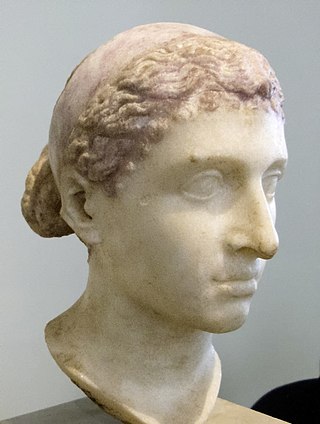
Cleopatra VII Thea Philopator was Queen of the Ptolemaic Kingdom of Egypt from 51 to 30 BC, and its last active ruler. A member of the Ptolemaic dynasty, she was a descendant of its founder Ptolemy I Soter, a Macedonian Greek general and companion of Alexander the Great. Her first language was Koine Greek, and she is the only Ptolemaic ruler known to have learned the Egyptian language. After her death, Egypt became a province of the Roman Empire, marking the end of the last Hellenistic-period state in the Mediterranean, a period which had lasted since the reign of Alexander.
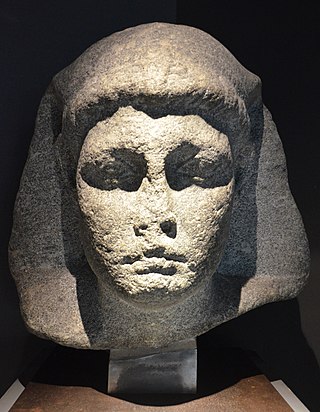
Ptolemy XV Caesar, nicknamed Caesarion, was the last pharaoh of Ptolemaic Egypt, reigning with his mother Cleopatra VII from 2 September 44 BC until her death by 12 August 30 BC, then as sole ruler until his death was ordered by Octavian.
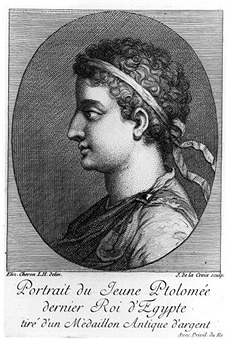
Ptolemy XIII Theos Philopator was Pharaoh of Egypt from 51 to 47 BC, and one of the last members of the Ptolemaic dynasty. He was the son of Ptolemy XII and the brother of and co-ruler with Cleopatra VII. Cleopatra's exit from Egypt caused a civil war to break out between the pharaohs. Ptolemy later ruled jointly with his other sister, Arsinoe IV.
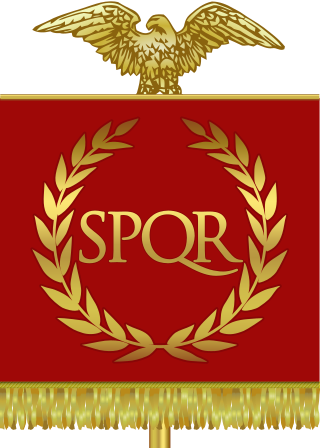
The Roman emperor was the ruler and monarchical head of state of the Roman Empire, starting with the granting of the title augustus to Octavian in 27 BC. The term emperor is a modern convention, and did not exist as such during the Empire. When a given Roman is described as becoming emperor in English, it generally reflects his accession as augustus, and later as basileus. Another title used was imperator, originally a military honorific, and caesar, originally a cognomen. Early emperors also used the title princeps alongside other Republican titles, notably consul and pontifex maximus.

A coronation is the act of placement or bestowal of a crown upon a monarch's head. The term also generally refers to the ceremony which marks the formal investiture of a monarch with regal power. In addition to the crowning, this ceremony may include the presentation of other items of regalia, and other rituals such as the taking of special vows by the new monarch, the investing and presentation of regalia to them, and acts of homage by the new monarch's subjects. In certain Christian denominations, such as Lutheranism and Anglicanism, coronation is a religious rite. As such, Western-style coronations have often included anointing the monarch with holy oil, or chrism as it is often called; the anointing ritual's religious significance follows examples found in the Bible. The monarch's consort may also be crowned, either simultaneously with the monarch or as a separate event.

Berenice IV Epiphaneia was a Greek princess and Queen of the Ptolemaic dynasty. From 58 to 55 BC, Berenice IV ruled Egypt during the political exile of her father Ptolemy XII Auletes to Rome. It is unclear if she was co-ruler of Egypt with her mother Cleopatra V or a possible sibling Cleopatra VI from 58 to 57 BC, but became sole ruler in 57 BC. On the return of Ptolemy XII to Egypt with Roman military aid and an army led by Aulus Gabinius, Berenice IV was overthrown and executed by her rival father, who later bequeathed his throne to his daughter Cleopatra VII and son Ptolemy XIII as co-rulers.
Prasutagus was king of a British Celtic tribe called the Iceni, who inhabited roughly what is now Norfolk, in the 1st century AD. He is best known as the husband of Boudica.

Tasciovanus was a historical king of the Catuvellauni tribe before the Roman conquest of Britain.

A princely state was a nominally sovereign entity of the British Indian Empire that was not directly governed by the British, but rather by an Indian ruler under a form of indirect rule, subject to a subsidiary alliance and the suzerainty or paramountcy of the British crown.

Annia Aurelia Galeria Lucilla or Lucilla was the second daughter of Roman emperor Marcus Aurelius and Roman empress Faustina the Younger. She was the wife of her father's co-ruler and adoptive brother Lucius Verus and an elder sister to later emperor Commodus. Commodus ordered Lucilla's execution after a failed assassination and coup attempt when she was about 33 years old.
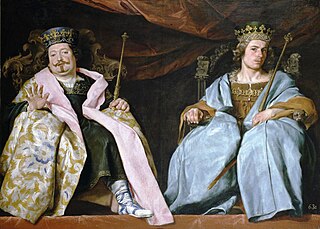
Diarchy, duarchy, or duumvirate is a form of government characterized by co-rule, with two people ruling a polity together either lawfully or de facto, by collusion and force. The leaders of such a system are usually known as corulers.
Adminius, Amminius or Amminus was a son of Cunobelinus, ruler of the Catuvellauni, a tribe of Iron Age Britain. His name can be interpreted as Brittonic *Ad-minios, "he who is very tender".
Eppillus was the name of a Roman client king of the Atrebates tribe of the British Iron Age. He appears to have ruled part of the territory that had previously been held by Commius, the Gaulish former ally of Julius Caesar who fled to Britain following the uprising of Vercingetorix, or possibly of his son. Eppillus is not mentioned in any historical sources. Coins bearing his name also bear the inscription COMMI.FILI which is generally read as Commios filius indicating at least a claim to be Commius's son.
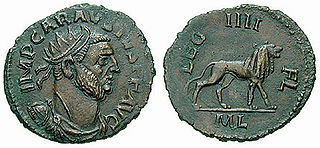
The Carausian revolt (AD 286–296) was an episode in Roman history during which a Roman naval commander, Carausius, declared himself emperor over Britain and northern Gaul. His Gallic territories were retaken by the western Caesar Constantius Chlorus in 293, after which Carausius was assassinated by his subordinate Allectus. Britain was regained by Constantius and his subordinate Asclepiodotus in 296.

The Trucial States, also known as the Trucial Coast, the Trucial Sheikhdoms, Trucial Arabia or Trucial Oman, was a group of tribal confederations to the south of the Persian Gulf whose leaders had signed protective treaties, or truces, with the United Kingdom between 1820 and 1892.
Cartivellaunos was a local ruler or king based in the English East Midlands, around the time of the Roman conquest of Britain. He is traditionally thought to have been a ruler of the Corieltavi, who inhabited this region in the Roman period and perhaps before.